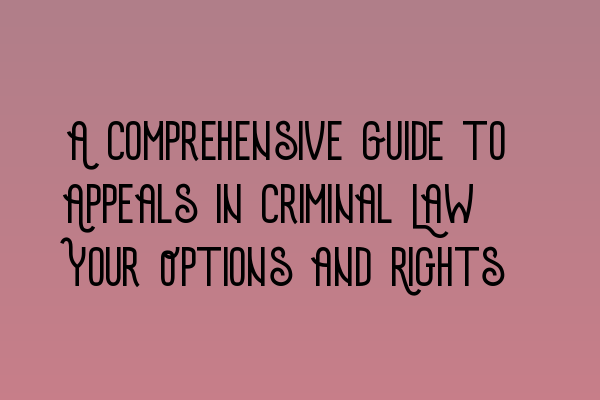A Comprehensive Guide to Appeals in Criminal Law: Your Options and Rights
Being convicted of a criminal offense can have serious consequences on your personal and professional life. However, it’s crucial to remember that you have the right to appeal the decision if you believe there were errors or injustices in your case. In this comprehensive guide, we will explore the various options available to you when it comes to appealing a criminal conviction.
1. Understanding the Appeals Process
Before delving into the specific types of appeals, it’s important to have a basic understanding of the appeals process in criminal law. Appeals are not retrials; they are a means to challenge the legality or fairness of the original trial. The appeals process typically involves presenting legal arguments to a higher court, which will review the lower court’s decision. The court will consider matters of law and procedure, rather than reassess the facts of the case.
2. Types of Appeals
There are several types of appeals available to individuals who wish to challenge a criminal conviction:
- Direct Appeal: This is the most common type of appeal, where the convicted individual asks a higher court to review the trial court’s decision.
- Appeal by Leave: In some cases, you may need permission from a higher court to appeal a decision. This is known as an appeal by leave.
- Appeal on Sentence: If you believe that the sentence imposed on you is excessive, you have the right to appeal the sentence itself, separate from appealing the conviction.
- Appeal on Point of Law: If you believe that an error in law occurred during your trial, you can raise the issue on appeal.
- Appeal on New Evidence: If new evidence has emerged that may significantly affect the outcome of your case, you may be able to appeal based on this new information.
3. Seeking Legal Assistance
When considering an appeal, it is highly recommended to seek legal representation from an experienced criminal solicitor. They can provide valuable guidance and ensure that your appeal is handled properly within the legal framework. Consulting with a solicitor who specializes in criminal law appeals will give you the best chance of success.
At SQE Criminal Law & Practice Law UK, we offer a team of highly skilled solicitors who are well-versed in handling appeals in criminal law cases. We have extensive experience navigating the appeals process and fighting for our clients’ rights.
If you’re in need of legal advice or representation for your appeal, don’t hesitate to contact our team at SQE Criminal Law & Practice Law UK. We will guide you through the process and work diligently to protect your rights and interests.
4. Conclusion
Appealing a criminal conviction is a complex process that requires careful consideration and expert legal guidance. By understanding the appeals process, knowing your options, and seeking the assistance of experienced solicitors, you can effectively navigate through the appeals process and have the best chance at a favorable outcome.
If you’re preparing for the SQE 1 or SQE 2 exams, we recommend checking out our related articles:
- SQE 1 Practice Exam Questions
- SQE 1 Practice Mocks FLK1 FLK2
- SQE 2 Preparation Courses
- SQE 1 Preparation Courses
- SRA SQE Exam Dates
These articles provide valuable resources and information to help you prepare for your exams and succeed in your legal career.
